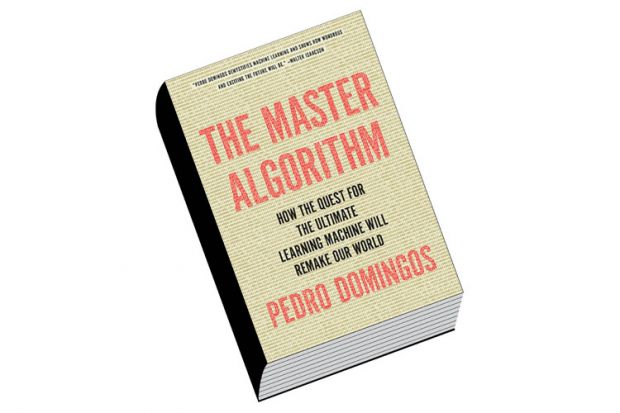Learning algorithms rule the world. They monitor our credit card use as we wander through life and they decide which of our transactions might be fraudulent; they trawl our email and messages for clues as to which pop-up advertisements we are likely to respond positively to; they watch the way we walk around urban areas and stations to calculate whether we represent a terrorist threat; and more generally, they support the infrastructure of society and business.
US-based computer scientist Pedro Domingos is a man with a quest, and a hypothesis, which is likely – one day – to change the world. He proposes that “All knowledge – past, present and future – can be derived from data by a single, universal learning algorithm”, the Master Algorithm of this book’s title. This algorithm could be the most momentous development in human history, but it could also be the last, potentially opening the door to a stultifying environment where all real power and reasoning has been handed to a technical construct that we are no longer capable of understanding.
Having set up this intriguing (if scary) premise, our host takes us on a journey through the history of how the concepts behind learning machines were derived and the multiple routes by which our current, limited understanding has been arrived at. Domingos is a genial and amusing guide, who sneaks us around the backstage areas of the science in order to witness the sometimes personal (and occasionally acrimonious) tenor of research on the subject in recent decades.
In discussing the origins of machine learning, Domingos draws out the various themes that have contributed to the topic as it appears today, and then brings them together in a single structure to illustrate the nature of the pieces we still need before we can complete the whole puzzle. We are offered the picture of machine learning as a continent divided into the territories of five tribes – of which the Master Algorithm is the capital city, standing in the centre of the landscape where the lands of the five groups meet.
These tribes are those of the Symbolists, Connectionists, Evolutionaries, Bayesians and Analogizers, who between them have given us many of our current tools and insights. Each of the approaches includes components of representation, evaluation and optimisation. Using the framework of a journey through this city, Domingos leads us along a complex route to a discussion of how current thinking on machine learning might scale to a planetary level.
This is a highly inclusive book, aimed at a wide range of readers from the merely curious to those who might be interested in pursuing a career in the field. Descriptions and discussions are presented with a commendable lack of jargon and the examples are clear and accessible – although computing folk will be pleased to see that everyone’s favourite nodes, Alice and Bob, make several appearances. Just occasionally, however, the text edges towards the frankly folksy in style. It’s a forgivable approach, given the complexity of the material the author is trying to convey, but one that can result in Clint Eastwood’s cinematic cop Dirty Harry jostling against Isaac Newton on the same page.
Perhaps inevitably, privacy of information is a discussion point here – but it is introduced only towards the end of the text. Domingos offers the concept of “data-unions” as a means of preserving some control over personal data – using them as a mechanism for influencing government action and balancing the immense power and reach of global corporations. This is an area I would very much like to see expanded on in future work.
John Gilbey teaches in the department of computer science, Aberystwyth University.
The Master Algorithm: How the Quest for the Ultimate Learning Machine Will Remake Our World
By Pedro Domingos
Allen Lane, 352pp, £20.00
ISBN 9780241004548 and 4555 (e-book)
Published 22 September 2015
POSTSCRIPT:
Print headline: One formula to rule them all
Register to continue
Why register?
- Registration is free and only takes a moment
- Once registered, you can read 3 articles a month
- Sign up for our newsletter
Subscribe
Or subscribe for unlimited access to:
- Unlimited access to news, views, insights & reviews
- Digital editions
- Digital access to THE’s university and college rankings analysis
Already registered or a current subscriber? Login




